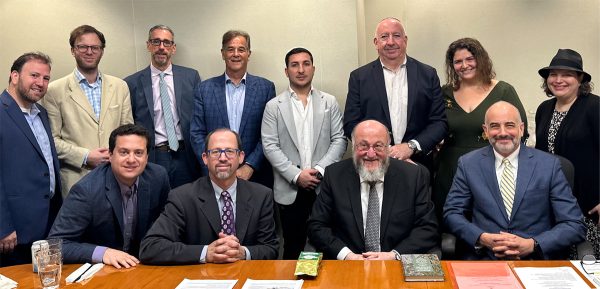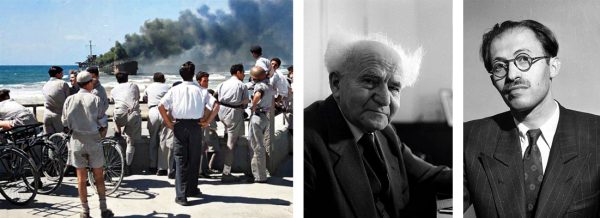By Doron Krakow
Achrayut | אחריות | Responsibility
Not long ago I was privileged to join a nascent coalition of Jewish organizations dedicated to the proposition that we share a commitment to Jewish peoplehood—that Jews the world over are imbued with a sense of responsibility for and accountability to one another. For many of us this idea may seem self-evident, but without an investment of time, energy, and attention, it is easy for us to drift into partisan, provincial, or parochial matters that seem more likely to emphasize difference and distinction than our shared history, heritage, and common destiny.
The coalition was inspired by a similar idea begun in 2019 in Israel, where ENTER: The Jewish Peoplehood Alliance, a relatively recent arrival on the Jewish organizational scene, began convening hundreds of leaders whose work is substantially focused on engaging Diaspora Jewry. Notwithstanding the myriad programs and perspectives, the emerging community of professionals has become a vital and vibrant network of colleagues, allies, and prospective partners—a community that has found in one another a remarkable support system during the pandemic and amidst the continuing uncertainties of Israeli politics. In short, their shared commitment to something larger than themselves animates their distinctiveness.
The North American coalition shares in that ideal and seeks elevated consciousness within and across our own organizations, as well as heightened determination to affirm and promote Jewish peoplehood as a central throughline and core value.
The work of the coalition has, from time to time, generated opportunities to sit in intimate conversation with some of the great minds in the Jewish world. So it was this week, when about a dozen of us were privileged to host Chief Rabbi Sir Ephraim Mirvis of the United Kingdom. During two memorable hours, we enjoyed a wide-ranging discussion about common concerns and shared opportunities.
Rabbi Mirvis regaled us with stories of his participation in the coronation of King Charles, which took place on Saturday, May 6. Sensitive to the fact that the festivities would unfold during Shabbat, the King invited Rabbi Mirvis and his wife to be guests of the royal family at the palace, so the rabbi could join the procession without the need for motorized transportation. Along the route, he was greeted over and over with “Shalom” and “Shabbat shalom” from countless spectators and well-wishers. A particularly poignant component of the ceremonies was the delivery of blessings from the United Kingdom’s faith leaders. As the camera zoomed in on the small cluster of religious figures, the BBC broadcast—watched by countless millions of viewers across the world—noted that microphones and amplified sounds had been turned off in deference to Rabbi Mirvis, who was observing the Sabbath. At this uniquely British moment, it was hard not to be struck by the reverence and regard shown not only for the chief rabbi but also for Jewish tradition and the Jewish people.
Amidst the “oohs and ahhs” and the warm smiles on every face around the table, the rabbi was asked to comment specifically on the matter of Jewish peoplehood. In response, he talked about achrayut | responsibility and what it means to be a leader. He shared his perspective on what he termed “the seven elements of responsibility” each of us bears as stewards of our unique link in the chain of Jewish history:
- Responsibility to Hashem—to finding favor in the eyes of God
- Responsibility to oneself—for personal well-being and continued growth and development
- Responsibility to family—and for providing Jewish inspiration to our children
- Responsibility to community—and fostering a sense of community at a time of growing isolation
- Responsibility to Am Yisrael—to the Jewish people
- Responsibility to Medinat Yisrael—to the state of Israel, the fulfillment of 2,000 years of longing
- Responsibility to the world around us—emphasizing that we all are created in the image of God
Afterward, he returned at length to #5, our responsibility to the Jewish people, not as an end, but as a means to an end. Rabbi Mirvis challenged us to do more than promote peoplehood as an ideal, but instead to do something with it—to celebrate unity, not uniformity, noting that it is our diversity that makes up the magnificent mosaic of the Jewish world and our sense of achrayut | responsibility that binds us together.

Left to right, bottom row: Shaya Lerner, Anti-Defamation League; Dr. Scott Lasensky, ENTER: The Jewish Peoplehood Alliance; Chief Rabbi Sir Ephraim Mirvis; and Doron Krakow, JCC Association of North America.
Critical to the work of promoting and advancing Jewish peoplehood are the entry points, the ways people engage or are inspired to come closer and become part of the community. Although Jewish suffering certainly has provided that entry point for many, so, too, have an array of creative programs. A moment of special pride for me and several other JCC Association colleagues present happened when the rabbi made mention of the JCC Maccabi Games® as being uniquely powerful and inspiring in this regard.
This summer, JCC Maccabi will bring more than 1,000 teens to the Games in Israel, part of our continuing celebration of Israel’s 75th anniversary. Among the participants will be delegations from Morocco, Ukraine, and a host of other countries around the world—in addition, of course, to a large delegation from Israel. The Games in Israel will be followed by those in Fort Lauderdale, Florida, and before this summer is over, more than 3,000 teens, along with 10,000 others—coaches, staff, host families, and community leaders—will have taken part.
Rabbi Mirvis’ visit to New York came about in connection with an address he delivered at the United Nations on Wednesday, but in a true reflection of his visionary leadership and inspirational commitment to Jewish peoplehood, he sought out opportunities to meet and engage with Jewish leaders who hungrily filled his two-day schedule. What a privilege it was to have been among them, spending time in the company of others committed to working together to bring the Jewish people to an ever-greater dedication to achrayut.
Am Yisrael Chai.
Shabbat shalom | שַׁבָּת שָׁלוֹם

Doron Krakow
President and CEO
JCC Association of North America


Only weeks after declaring independence, the newborn state of Israel found itself on the brink of civil war. Though the three pre-state militias that had been instrumental in driving the British from Palestine had been melded into the newly formed Israel Defense Forces (IDF), Jerusalem remained outside the boundaries of the new state, and independent militia activity there continued. Menachem Begin, a future prime minister, was the leader of one such militia, the Irgun Zvai Leumi (IZL), which, prior to May 14, 1948, had arranged for the arrival of a shipload of arms and immigrants. An agreement was reached with the new government to provide the majority of the arms to the IDF, with a small portion earmarked for IZL fighters in Jerusalem.
Amidst inconsistent communications as the ship, Altalena, the pen name of Zionist leader Zeev Jabotinsky, arrived on the shores of Israel, the government demanded the entirety of the arms be transferred to the IDF, and David Ben-Gurion issued an ultimatum: Unless the order was quickly followed, the ship would be sunk with all hands remaining on board—among them Menachem Begin. The stalemate continued, and the order was given. Israeli soldiers, under the command of Yitzchak Rabin, another future prime minister, opened fire on the ship, setting it ablaze, and on the desperate new arrivals trying to swim to shore. Sixteen Irgun members and three Israeli soldiers were killed in the exchange.
Civil war was averted when a wounded Menachem Begin, who had been forcibly carried from the burning ship, issued an order to his followers forbidding any further attacks by Jews on Jews.
And that’s the way it was…
Reader Interactions